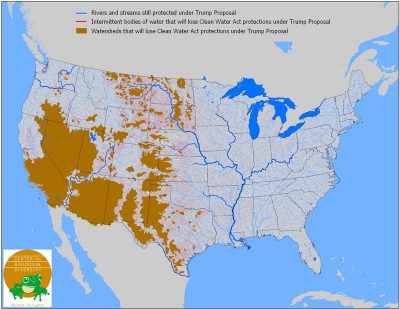Lawsuit Launched Over Trump’s Massive Rollback of Pollution Protections for Rivers, Wetlands
Rule Threatens Millions of Acres of Wetlands, Hundreds of Endangered Species

Conservation groups filed a formal notice of intent to sue the Trump administration today for eliminating longstanding protections for the nation’s waters, including approximately half of all wetlands and potentially millions of miles of streams. The Trump rule allows polluters to pave over wetlands and dump pesticides, mining waste and other pollutants directly into these now-unprotected waterways.
The impacts of this Clean Water Act rollback were revealed by a leaked Environmental Protection Agency analysis that indicates arid states like Arizona, New Mexico and Nevada could lose protections for the vast majority of their waters. The loss of protections puts hundreds of endangered species at greater risk of extinction, including the Chiricahua leopard frog, Chinook salmon and southwestern willow flycatcher.
“Trump’s despicable giveaway to polluters will wipe out countless wetlands and streams and speed the extinction of endangered wildlife across the country,” said Brett Hartl, government affairs director at the Center for Biological Diversity. “Even as we’re fighting this in court, the polluters will rush to fill in wetlands and turn our waterways into industrial toilets. So go outside, take a swim, or go fishing at your favorite spot now, because the deluge of pollution unleashed by Donald Trump will soon touch waterways from coast to coast.”
The final rule limits protections only to wetlands and streams that are “physically and meaningfully connected” to larger navigable bodies of water. The radical change repeals longstanding protections for wetlands, streams and rivers that have been in place since the Nixon administration and that are responsible for major improvements in water quality nationwide.

WOTUS map by Center for Biological Diversity
President Trump’s Executive Order 13778 required the EPA and Army Corps of Engineers to review the rule defining which waters deserve Clean Water Act protections. The agencies decided to protect only those waters that have “a relatively permanent surface connection” to a territorial sea or commercially navigable body of water such as a shipping channel — a myopic legal interpretation that ignores decades of settled law and the basics of hydrology. The rule partially follows the minority legal view of the late Supreme Court Justice Antonin Scalia, which was never adopted by the Supreme Court, but goes even further to eliminate protections for many other waters across the country.
“This reverses more than 40 years of progress and settled law,” said Kelly Hunter Foster, a senior attorney at Waterkeeper Alliance. “Because the rule establishes arbitrary categories of protected waters, EPA and the Army Corps do not have the data necessary to fully identify the waters that will lose protection and they haven’t even assessed the impacts of leaving these waters unprotected where adequate data is available. Their actions are not only reckless — they are illegal.”
In rushing to comply with Trump’s executive order, the agencies violated both the Endangered Species Act and National Environmental Policy Act. Both laws require the federal government to “look before you leap” and ensure that the environmental consequences of a particular action will not cause unintended environmental damage.
“Clean water is the single most important resource for countless species, including humans,” said Annalisa Batanides Tuel, advocacy and policy manager at the Turtle Island Restoration Network. “Right now we’re facing the reality of climate change and widespread habitat loss. It is critical to expand Clean Water Act protections — not shrink them — if we want to avoid mass extinction.”
Today’s notice of intent was submitted by the Center for Biological Diversity, Waterkeeper Alliance, Center for Food Safety, Turtle Island Restoration Network, Humboldt Baykeeper, Lake Worth Waterkeeper, Missouri Confluence Waterkeeper, Monterey Coastkeeper – A Program of the Otter Project, Rio Grande Waterkeeper, Sound Rivers (Upper Neuse, Lower Neuse and Pamlico-Tar Riverkeepers), Russian Riverkeeper, Upper Missouri Waterkeeper and Snake River Waterkeeper.
The organizations are represented by the Indian and Environmental Law Group of Oklahoma.
*
Note to readers: please click the share buttons above or below. Forward this article to your email lists. Crosspost on your blog site, internet forums. etc.

